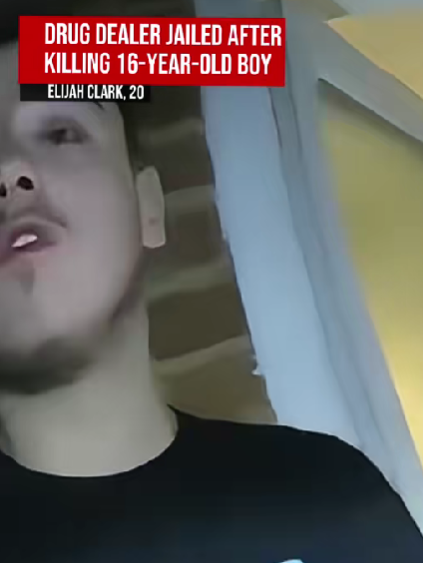A chilling case has come to a close after a 20-year-old man was sentenced to prison for the death of a 16-year-old boy, following a fatal drug-related incident that has left an entire community heartbroken.
Authorities say the young dealer, Elijah Clark, was found guilty after an investigation revealed that he had supplied a dangerous substance that led to the teen’s tragic death. The court heard how Clark, who had been dealing drugs through social media platforms, showed little regard for the risks his actions posed.
The victim — whose family has asked that his name remain private — was described as a bright, kind-hearted student who made one devastating mistake: trusting someone who exploited his vulnerability. Prosecutors explained that the teenager had been experimenting with drugs when he came into contact with Clark online. Within hours of receiving the substances, the boy was found unresponsive by his parents.
Emergency responders rushed to the scene, but it was too late. Toxicology reports later confirmed that the drugs contained dangerous synthetic compounds known to cause fatal overdoses even in small doses.
During sentencing, the judge delivered a stern message: “You may not have intended to end a life that night, but your actions set in motion a tragedy that can never be undone. You were old enough to know exactly what you were doing — and young enough to understand the value of a life you destroyed.”
Clark, who had pleaded guilty to manslaughter and distribution of a controlled substance, reportedly broke down as the victim’s mother addressed the courtroom. Through tears, she said, “My son was just a child. He didn’t deserve to die like that. And you didn’t deserve to have the power to take him from us.”
The case has reignited calls for stricter penalties on those who sell drugs to minors and stronger online monitoring of illicit activity. Investigators revealed that Clark had been using encrypted messaging apps to arrange deliveries, often disguising the transactions as harmless sales.
Detective Laura Bennett, who led the investigation, called the case “a painful wake-up call” for parents and communities alike. “We’re seeing younger and younger victims,” she said. “Social media has made it easier for dealers to reach kids directly — and the consequences are devastating.”
Local schools and youth organizations have since launched awareness campaigns emphasizing the dangers of counterfeit and synthetic drugs, which are increasingly linked to accidental overdoses among teens.
Outside the courthouse, the victim’s family said they hoped the sentencing would serve as a warning. “No sentence will bring our boy back,” his father said quietly. “But if this story stops one more kid from making that mistake — or one more dealer from selling death — then at least something good can come from our pain.”
Clark was sentenced to 15 years in prison, with the judge noting that he will serve at least two-thirds before being eligible for parole.
This case is a haunting reminder that behind every headline about drugs and crime lies a story of lost potential, shattered families, and irreversible choices.
